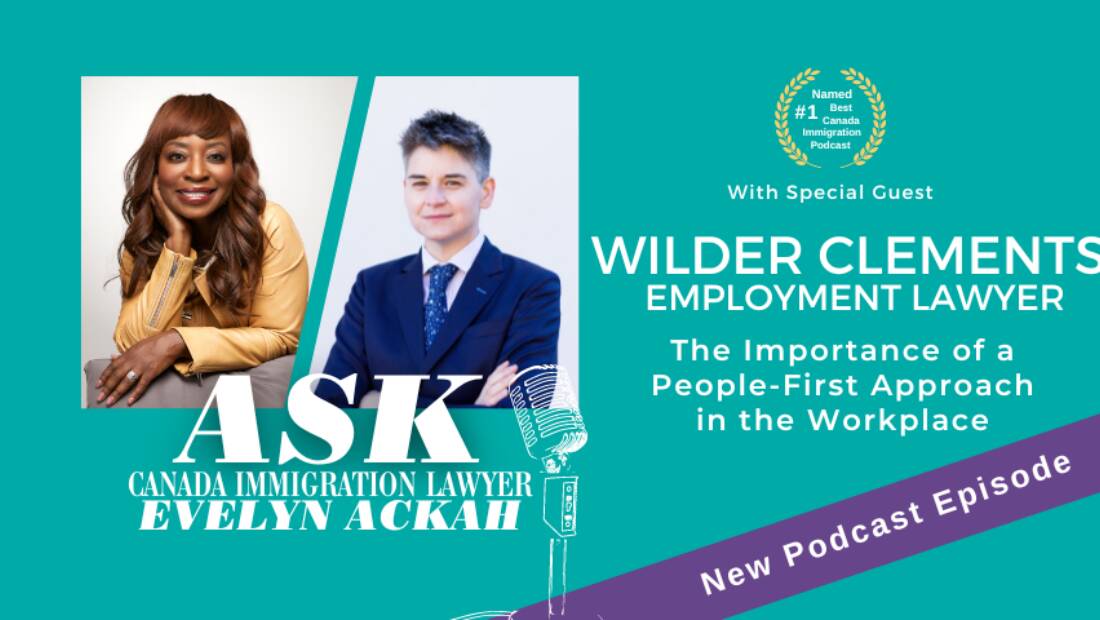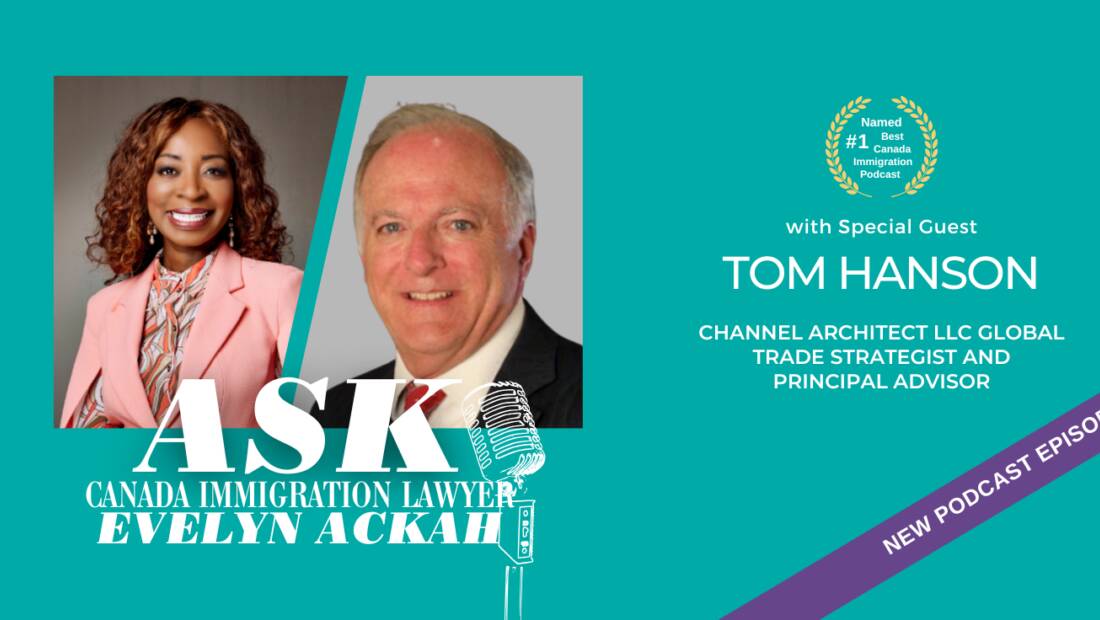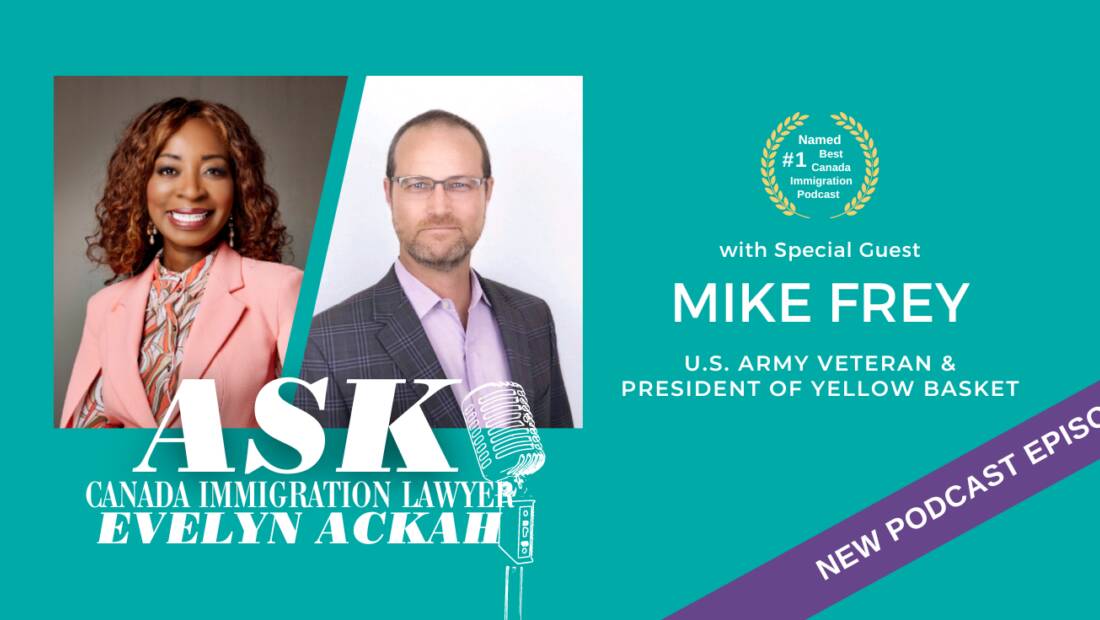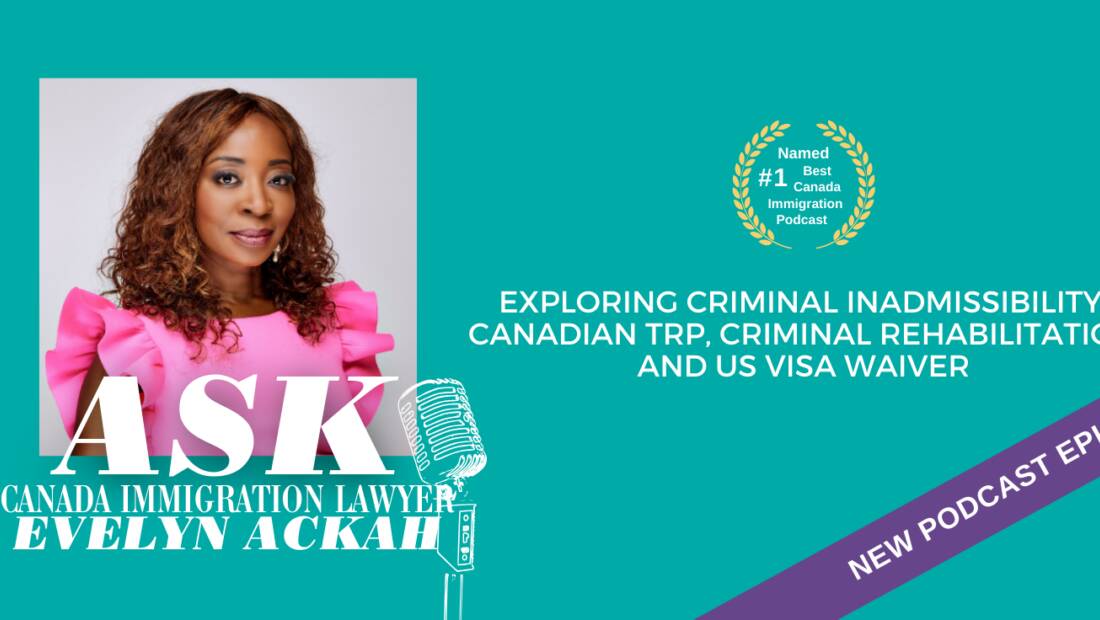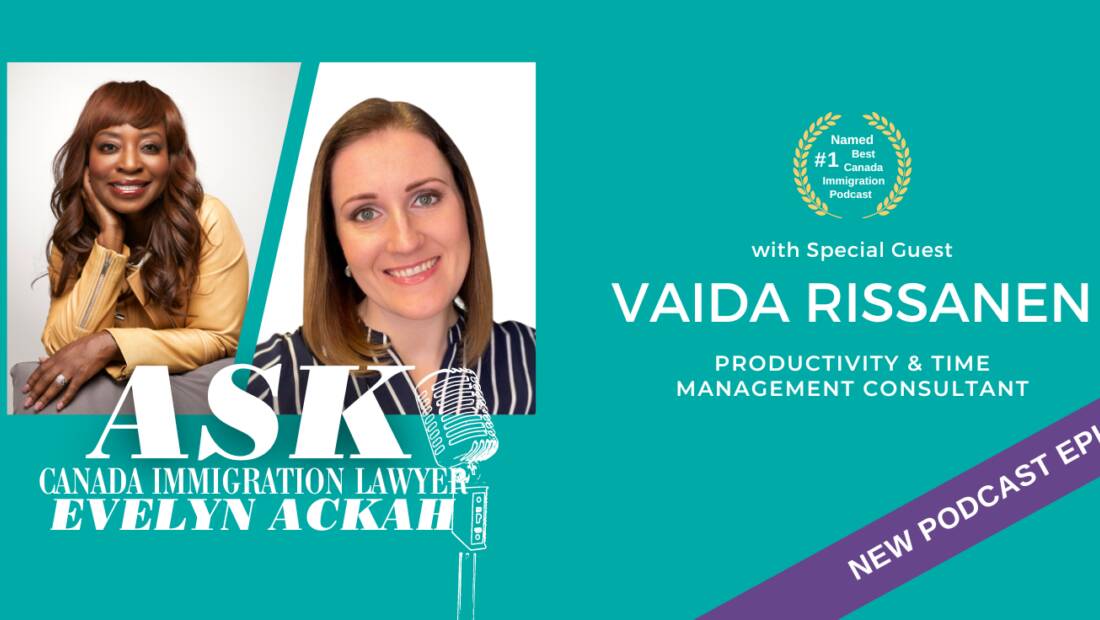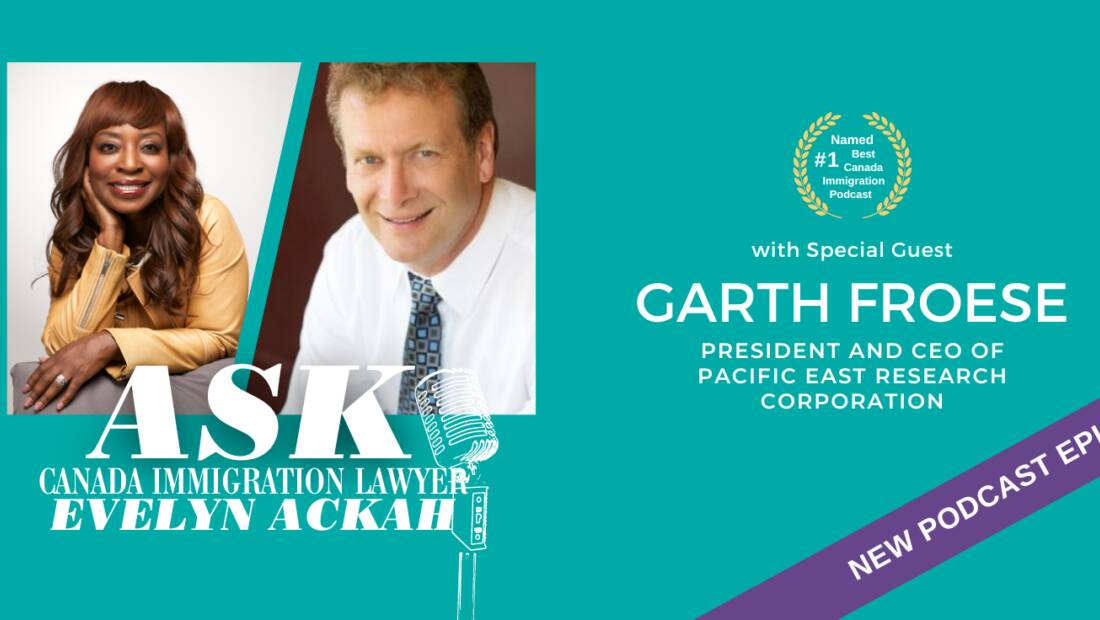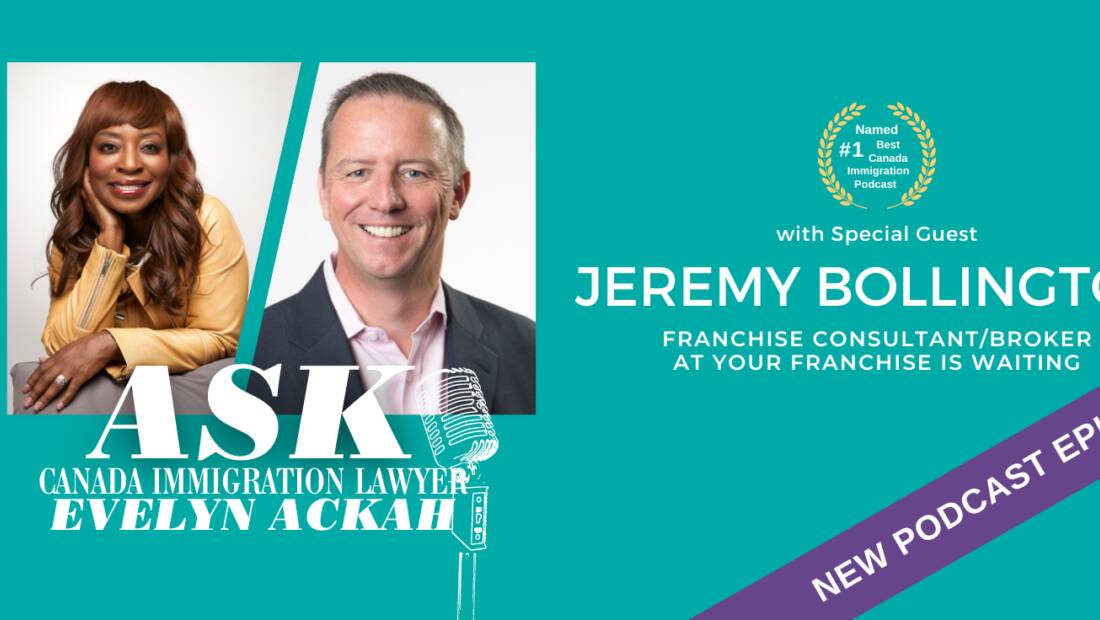Or listen on your favourite podcast app
In this podcast episode of Ask Canada Immigration Lawyer Evelyn Ackah, Evelyn interviews Wilder Clements, the owner and managing lawyer of Clements Employment Law in California. They discuss various topics related to employment law, including the importance of a people-first approach in the workplace, the unique challenges and obligations faced by employers in California, the legal implications of trends such as AI, automation, remote work, the gig economy and the significance of building a strong employer brand. Wilder also shares insights and advice based on her experience as an employment lawyer and entrepreneur.
Connect with Wilder Clements on LinkedIn.
BOOK YOUR FREE CASE EVALUATION
Here are the key takeaways from Evelyn Ackah's podcast interview with Wilder Clements, a California employment lawyer:
California Employment Law
- More complex than federal law and many other states.
- Employers have stricter obligations regarding meal and rest breaks, pay stub accuracy, and misclassification of employees.
- EPLI insurance is highly recommended due to the prevalence of lawsuits and high potential penalties.
The Future of Work
- Remote work is here to stay, but employers need to find a balance between flexibility and team building/training.
- Clear communication, established values, and employee surveys are crucial for remote work success.
- Legal compliance and data protection are essential for remote work setups.
- Monitoring can be done ethically to ensure productivity, but shouldn't be excessive surveillance.
Employer Best Practices
- Develop a strong employer brand to attract and retain talent.
- Encourage open communication and feedback from employees.
- Invest in HRIS systems and consider HR consultants for record-keeping and conflict resolution.
- Focus on preventing discrimination through training and diverse recruiting practices, avoiding quotas.
Entrepreneurial Journey
- Lawyers can find success with their own firms by offering alternative fee structures and prioritizing client alignment.
- Preventative law services can be valuable for both employers and employees compared to litigation.
- Business skills are crucial for lawyer-entrepreneurs, and some may wish they had learned more about accounting and bookkeeping.
About Evelyn Ackah
Evelyn Ackah is the Founder and Managing Lawyer at Ackah Business Immigration Law. With offices in Calgary, Toronto and Vancouver, we work with individuals and business owners from all over the world who want to cross borders seamlessly. For more information on immigration to Canada or the United States, Ask Evelyn Ackah at Ackah Business Immigration Law today at (587) 854‑3821 or email Evelyn directly at contact@ackahlaw.com.
The Ask Canada Immigration Lawyer Evelyn Ackah podcast by Calgary Immigration Lawyer Evelyn Ackah was named #1 Best Canada Immigration Podcast in 2023 by Feedspot.
BOOK YOUR FREE CASE EVALUATION
Transcript
Evelyn Ackah:
Hi everyone. Welcome to Evelyn Ackah's podcast. You know I'm a cross-border immigration lawyer, and I'm so excited to have Wilder Clements joining me on the Ask Canada Immigration Podcast. Welcome, Wilder.
Wilder Clements:
Thank you for having me, Evelyn. Good to be here.
Evelyn Ackah:
I'm really excited you're here. Wilder is the owner and managing lawyer of Clements Employment Law, based in California. I'm going to give you a brief bio. Wilder brings experienced and value-driven counsel to purpose-driven businesses and organizations with challenging employment law questions and issues. Wilder is experienced in advising clients on the complexities of federal and state labor and employment law. They understand steps business and organizations need to take to treat and pay their workers fairly, and serves as an instrumental partner in helping organizations and businesses align their purpose with people first practices. I'm very interested, Wilder, to learn all about people first. Welcome, and I'd love to hear about how you became an employment lawyer. Let's start there, with your process and your development into being a lawyer.
Wilder Clements:
I became an employment lawyer because I had an interest in labour and employment and workplaces, and I first started doing policy work in Washington DC before I went to law school, working on some civil rights legislation on a national basis. When I came to UC Berkeley, focused in on labour and employment law, and had the opportunity to, after law school, work on developing a model national program for paid family leave, paid parental leave, which we still don't have here in the United States, but we do have that in California, and a few other states, so studying what California had done. Then I went and became a real lawyer, and litigated, and worked in an AM Law 200 firm, and became labour and employment Council, mostly to employers, and then decided to go out on my own. I've always had an entrepreneurial spirit. I'm a fourth generation lawyer in my family.
Evelyn Ackah:
Oh my God.
Wilder Clements:
All of whom have owned their own firms.
Evelyn Ackah:
How long have you had Clements Employment Law? When did you start?
Wilder Clements:
I've been doing this for five years.
Evelyn Ackah:
Wow, that's exciting. You and I have a similar trajectory. We did the big law thing, and said, "Enough of that. I could do this differently better, and make it feel better as well, for ourselves." I think that's really important. I want to get into the questions, Wilder, because California is so different. When I think about immigration and our clients that move to the U.S., that go to California, or the HR people that we work with that are on both sides of the border, they're always asking, Canadian-ize something, or Americanize a document, or Californa-ize a document. Tell me about this culture first in California's evolving workplace. How does that work? Explain your unique culture first approach, because I don't really understand what that means, except knowing that it's about the importance of a business's culture. How does that approach impact your practice?
Wilder Clements:
I have seen, over my 13, almost 14 years of defending employers in high-stakes lawsuits, counselling employers, and dealing with all kinds of disputes that, at the end of the day, at least half of those disputes involve some kind of cultural breakdown in the workplace. Whether it's a communication breakdown, people moving too fast in terms of managers, and not taking the time to really mentor, and do those check-ins, or whether it's something bigger, like not paying attention to demographic changes in the workplace, that older folks in the workplace need to be trained on, or even younger people not taking the time to teach older workers how new technology comes in. Workplaces really are... they are not families, but they are their own cultural institutions.
Evelyn Ackah:
Yes, they are.
Wilder Clements:
I say, no matter how small or big the company, culture is a liability for organizations that don't tend to it. What I mean by culture first, it's a commitment. It's a values approach. We cannot be successful without our workers.
Evelyn Ackah:
That's right.
Wilder Clements:
Our workplace needs to evolve for technology, to be competitive, all of that, but we're committed from the top down to developing a positive, inclusive culture. Again, I think that because I've seen so many disputes really just arise out of miscommunication, lack of trust, my role, I really wanted to be able to prevent those disputes from even getting filed in court. I focus a lot on preventative work, and in California, there's no shortage of doing that, because we are our own little mini country here, the fifth-largest economy in the world. We have our own labor and employment scheme that is quite different from many other states and federal law.
Evelyn Ackah:
Okay. Oh my God, that's so interesting. When you say culture first, do you mostly work with employers or employees, Wilder?
Wilder Clements:
I mostly work with employers. I find that work is rewarding, because I really get to help develop that culture, especially for newer businesses. I started my own firm because I was advising a startup in San Francisco. A woman of color got the most funding anybody had gotten from VCs in Silicon Valley, and honestly, she encouraged me. She's like, "I don't want to give my money to these big firms. Why don't I just work with you?"
Evelyn Ackah:
Oh, I love that. I think I even know who that is. That's exciting. When we all talk about California law, I've talked to lots of other lawyers across the U.S., but you're the first employment lawyer I've spoken with on this podcast, what makes California so different? What are some of the practical differences, or what are the weird situations that you encounter in California, or obligations that employers have that they don't have anywhere else?
Wilder Clements:
I think I'll start with something that HR professionals, admin people, the bane of their existence, the technicalities of how to pay people in California, particularly hourly workers, is very complex. Also, California is very strict with respect to what we call misclassification of employees. You can't just start your startup and employ a bunch of independent contractors in California. That will run you into some issues. Also, things like providing meal and rest breaks is something that's not a federal law, but almost every big company doing business in California has seen multimillion dollar lawsuits on that issue in the last 10, 15 years, because it's become very easy in California to bring a class action lawsuit against an employer on a state level, under state law. That has become so easy, plus, there's a couple of particular laws in California, the Private Attorney General's Act, which can allow an employee to bring not even a class action lawsuit, but a separate claim, a representative action.
There are just millions of dollars of penalties that can accrue for even technical pay stub violations, like for example, including the wrong business address on a pay stub. If you've done that for a few hundred employees over three, four years, that's going to cost you money. There are a lot of technical requirements. I think that's a big risk factor. The second risk factor is, California is a very diverse state, and it prides itself on its diversity, equal employment opportunity. It's been on the vanguard of civil rights legislation since 1930, and it prides itself on having very robust civil rights protections for a variety of its very diverse demographics. The California Department of Civil Rights is very active in enforcement, and that makes it even more important for California employers to make sure they're developing that, again, inclusive work culture, not just because it's a good way to do business, but it's also a really good way to stay in compliance.
Evelyn Ackah:
Of course. It sounds like it's so interesting, very compliance-focused. Some of the things you're telling me, I'm like, "Little mistakes?" Again, with a little mistake, if it's an address, where did that come from? It almost feels like, for an employer, it's almost a scary culture to be in, where you just are like, "Whoa, something is coming up." Where did that compliance-focused and seeking lots of different claims, or actions come from in California, and originate from? Do you have a sense of that? It feels like it's almost biased now against the employer. There's not a real balance.
Wilder Clements:
I think with some of these technical violations that employers can run into, it is too heavy on the penalties for technical violations. At the end of the day, who wins in that calculation? It's not workers, it's attorneys. It's attorneys, because a class action, of course, if an attorney wins, they take 40% of that class action settlement, and a worker may be getting a couple of hundred bucks.
Evelyn Ackah:
Wow.
Wilder Clements:
Not to be too cynical, but I do think that there have been mechanisms that make it much easier for the plaintiff's bar to take home really large settlements for what, honestly, is not that most of an impactful thing for workers. That said, I think the purpose is, California wants employers to... what's the point of having the right address on the pay stub? What's the point of making sure each-
Evelyn Ackah:
Yeah, do it right.
Wilder Clements:
They want workers to be able to tell, "Here's what I was paid, here's what I was paid for, and whether or not it was right." I understand that policy purpose behind it.
Evelyn Ackah:
For sure. We want to always be correct. The issue is, mistakes happen, people are human, and it just seems quite punitive compared to the Canadian culture, let's just say that. I'm like, "Wow." One thing we've talked about before, just in some of our other chats, has been EPLI insurance. This culture in California of really focusing on the employee, it seems like, and protecting employees, which I think is a great thing, is the EPLI insurance so much more critical now because of the level and volume of potential punitive damages, et cetera? Will it help, if somebody is in a situation that you're describing, that there's a class action based on the wrong address? Will that actually protect the employer, or not really?
Wilder Clements:
The answer is yes and no. A California employer, if you've reached even 20 employees in California, I recommend having a serious conversation about carrying employment practices liability insurance. A lot of EPLI policies don't necessarily cover wage and hour class action lawsuits. It's like wildfires in California, where employers have become uninsurable because they have the wildfire of wage and hour litigation. It really depends, from policy to policy. You have to be careful to ask the right questions. Maybe you'll be able to get defence costs covered, but not the ultimate settlement, for example, in a class action. Generally, for wrongful termination cases, cases of discrimination, harassment, that kind of thing, those cases are generally covered by most EPLI policies that I have seen, and are very valuable to have.
Evelyn Ackah:
Okay, so we recommend every California employer have lots of EPLI insurance. I remember that conversation, at the end, I was like, "I need to check if we have it," because it's not as common in Canada, actually. It's becoming more, but I think if you have more regulations, you need it more. Right. I think that's important. I've already looked into it. I want to talk about the future of work, because I know you speak and you present all over, for employers as well as for businesses, discuss the legal implications of some of these trends, Wilder, they're around AI, automation, remote work and the gig economy. It's a big challenge for me as an employer. Half of my team is remote, which is great, and we still have an office, because the rest are here, but it becomes a struggle as an employer when you're like, "Somebody wants to go work from home, and their job is really not a job that would necessarily be possible to work from home." Tell me, what are you seeing right now in terms of that?
Wilder Clements:
I can't even count the number of remote work policies, arrangements I have drafted in the last four years, and continue to as this evolves. Remote work, I think in terms of the future of work, depending on the job, it was already happening before the pandemic, and now it is absolutely here, especially for younger generations of workers. There's a real balance, though, that employers need to strike. They have to be able to also provide effective training opportunities, especially for those younger workers just out of college, just out of law school or professional school, and some of that training needs to happen in person, on the job. Sometimes I'm seeing cases where those more junior employees are coming into the office two, three days a week, but their managers are working from home, so their managers aren't there to train them.
I think an organization needs to take a step back and really articulate, what are their values around both flexibility, wanting to make sure people have reasonable flexibility, as well as the values around creating a team, and collaboration, and how do we do that? You can be creative in doing that. Maybe it's not that you're in the office five days a week with each other, but maybe it's having more quarterly intensive, in-person events. I've seen clients be very creative with this. The point, again, comes back, for me, to communication and values. Don't just wing it. There is legal, of course, compliance issues-
Evelyn Ackah:
Write it down.
Wilder Clements:
To winging it, but write it down. Make sure your managers on board, take some employee surveys to see what people actually want.
Evelyn Ackah:
I'm taking notes, girl, because as I know, we've morphed, like many people through COVID, into, everybody was in the office, to having remote people that could be. It definitely forces the firm to be flexible, but also creative, as you say. We just had our quarterly launch for our quarter. We always do a quarter meeting all day. We had everybody on Zoom, and then everybody that was in the office, and it was a long day of values, and process, and goals, and all those things. I think what you're saying is right. There has to be some way to actually be together.
For instance, in Canada, I have a baby lawyer I call her, right now in my office, but you can't really article, it's like interning, or clerking. How do you do that to somebody who is just out of law school, doesn't know anything, and they're sitting at home? I think it has to work in the way that you just described. This has to be practical. How do you share all the knowledge in my head, and try to give that mentoring and training, and it's all remote? I don't know if it's possible all the time.
Wilder Clements:
Yeah, I agree. I don't think it's possible all the time. There are some creative solutions. A junior or attorney wants to be able to just pop in and ask a really quick question without having to schedule a separate Zoom. Some of my clients have working sessions, where they'll pop on Zoom together, and they'll just turn off their camera, put on mute. They'll work together, and if they have a question, come off of mute.
Evelyn Ackah:
I love that.
Wilder Clements:
That's one thing.
Evelyn Ackah:
That's great. What about monitoring? This is the question I'm sure you come up with when you think about AI, and automation, and the gig economy. Monitoring or not monitoring, how you know your people are working, those must be issues that are coming up for your clients. What do we do to make sure they're actually not doing five jobs? How do we know they're producing the same quality work as if I was walking down the hall, and I could see them?
Wilder Clements:
Yeah, I think this is where it becomes very important, just because someone works from home, to not treat that as an informal environment, to treat that home office as an extension of your actual office, meaning that, employees need to be provided with company equipment, ideally. Just like any company is going to be monitoring systems and things like that, monitoring when people are... at least doing some spot checks. This is not about surveillance, but some spot checks around, is this person really online, doing what they're doing? Of course, I can't emphasize enough the importance of a good employee handbook that spells this all out, and a confidentiality agreement that makes sure also that your data is protected. Also, now that you've mentioned AI, making sure that you have, in your confidentiality agreement, very clear that your associate's not putting attorney-client privilege information into chat GPT.
Evelyn Ackah:
Oh me God, now you're freaking me out. I'm writing it all down. I have to update our manual. This chat GPT thing, what you're saying is... I've never used it for that, I hardly use it, we usually just use it to draft blogs or something, but to put in, "This is the file, and this is the case, and this is," really? Oh my God.
Wilder Clements:
Yeah, be very careful about that. Don't do it.
Evelyn Ackah:
Don't do it, obviously.
Wilder Clements:
Also, we've seen that the output for chat GPT for lawyers is not... don't do what that attorney did in New York.
Evelyn Ackah:
New York, yeah. We're all watching that. That was the most stupid thing I've ever heard of. Yeah, there are other ways to do it. We use a lot of automation in our practice, and especially when you're smaller, you want to take advantage of technology. Any risks there that you can see, from an employer perspective? We use Zapier for a whole bunch of things, just to get the information we need from people. We automate text messages and things like that to clients. What are you seeing in that sphere in particular, with employee/employers?
Wilder Clements:
I used to give trainings that said, "The E in email stands for evidence," and now, I give training that says, "The S in Slack stands for [inaudible 00:20:47]."
Evelyn Ackah:
Slack.
Wilder Clements:
However you're communicating with employees, or of course, customers, clients, again, don't treat those systems as informal as they look, because the reality is, we're all entering this data. The data, either you have an obligation to keep the data, or you have an obligation to produce the data, and a lot of things just are kept. I have seen, just in terms of also litigation, an absolute increase in e-discovery. My advice on text messaging systems, those communication systems, I'm fine with them, but I want them to be owned by the company, and the company to be the administrator of them. I don't want to see personal cell phones really being used very much. There's all kinds of reasons for that.
Evelyn Ackah:
Yeah, I agree with that completely. We have a Slack policy, of course, in the firm, and confidentiality, but it's always a new world. Now, I've been seeing other cases where employees are taking pictures of the Slack for purposes of other things, and it makes you start feeling, "Oh my God, am I under attack?" How do you deal with employers who start to feel just a loss of faith, of goodwill, because they're being sued, or being questioned? Do you feel like they're losing some of that optimism of being an entrepreneur, or a business owner sometimes?
Wilder Clements:
Oh, definitely I do. I do get that. I do advise a lot of entrepreneurs who maybe haven't ever had to fire somebody, and once they go through that once, I guarantee them that it's easier the second time, and then they get their systems buttoned up. This is why it's time-consuming but important to have those team expectation meetings, those team meetings where you're continually communicating what the values and expectations are. Again, you are ultimately- [inaudible 00:24:14].
Evelyn Ackah:
Responsible.
Wilder Clements:
You're going to have a bad apple, you're going to have something happen, and usually, it's more about how you respond. I use the word respond carefully. Don't react, respond to a situation.
Evelyn Ackah:
Yes, I hear you. Call your lawyer right away, before you do anything. I know I have my great employment lawyer. It's important. It's just like your banker. You need to have a good employment lawyer on speed dial for anything, before you do anything, and make sure that you've set up your systems and policies. Tell me about this employer brand. Building a strong employer brand, I love that, but what does that mean to you, and the connection between the employee experience and the reputation of your firm, and what businesses can do to really leverage that?
Wilder Clements:
I think employer brand is more important than ever, just because your one Google search away from a very bad review by an employee. Of course, a lot of folks are going to understand, "This is a one disgruntled employee," but if there's 20 or 30 not so great reviews, that's why this is important. People are looking for workplaces that give them both professional development and seem to care about them as a human, which is, I think, increasingly difficult in a remote environment. I do think it's definitely important to attracting and retaining the best talent, and I like to say, "Don't be afraid to ask for feedback from your staff." You don't know what you don't know, and I'd much rather you know, "Hey, I actually think I'm being paid 20% less than what I should be," or, "I am working 24 seven, but my boss has no idea." I'd rather know that-
Evelyn Ackah:
For sure.
Wilder Clements:
So I can address it. I think that being open to reasonable feedback is a really good quality for an employer.
Evelyn Ackah:
As opposed to a pile-on, there's a balance. We just started using a program that's an HR program, because we're at the point where we need more than just informal, or surveys that are not being kept. This program is a platform that keeps everything, and we can send these quick little feedbacks, and check-ins, because you have the remote and the in-person people. I'm really hoping that will also help us to create that sense of, we're all together, but also, to keep records better. The reviews you do, whether it's quarterly and semi-annually and annually, they're all in one place. How do you recommend that employers, say they're small to medium, we're small, maybe 16 people or even less, how do you recommend they keep records so that they can help protect themselves?
Wilder Clements:
Investing in a good HR IS system, human resources information system, is a good idea. Also, have your employment lawyer on dial, but also consider, at what size do you might need to bring some in-house people operations or HR experience? Either bring it in-house, or have an HR consultant.
Evelyn Ackah:
Consultant. Yeah, that's what we have.
Wilder Clements:
I'd like to shield the people on the top from some of the more difficult conversations, and being able to have somebody who's trained, who knows this stuff, who can be on top of things is a really good idea for a growing business. I think an HR consultant is a really important asset to bring in, and ideally, someone who's not just doing the back end things like payroll, but can actually offer some conflict resolution services, being able to offer some facilitation in the workplace. I think that's a really effective tool.
Evelyn Ackah:
I think so, too. One thing in the States is, you had, you have, I don't even know, tell me, affirmative action laws, which are very different in Canada. Do you still have it, or was that completely abolished? I wasn't sure how it works. Also, in employment, as an employer, how are you seeing those provisions around other discrimination? How are they managing that?
Wilder Clements:
Generally, affirmative action is illegal in the United States, following the Supreme Court's decision this last summer. In fact, in terms of private businesses who don't receive government funds, it was already illegal to affirmatively consider race or gender, or any other factor in an employment decision, with some limited exceptions. That definitely bumps up against companies' efforts on diversity, equity, and inclusion.
Evelyn Ackah:
No.
Wilder Clements:
Again, I think on diversity, equity and inclusion, there are so many ways that you can address preventing discrimination, cultural competence, without quotas, without being like, "You check this box." In fact, I think a lot of workers, they don't want that. They actually just want their bosses to not discriminate, to not harass, to have some cultural competence. I think there are so many ways you can address DEI with training, with recruiting at the right places. It's definitely not illegal to support community-based organizations that are helping build the pipeline of talent. I actually think that there is a lot of other holistic ways to support talent that have nothing to do with affirmative action.
Evelyn Ackah:
That's good. It is very different in Canada. Listen, as we get close to the end, I want to talk a little bit about, you started your firm, like I did. Yours is five years old, and you're busy, which makes me very happy. The entrepreneurial journey, no matter how much you like it, is also very challenging. I don't come from a family of lawyers, and the fact that you've had all these four generations... what was the biggest reason you decided to start your own law firm, Wilder?
Wilder Clements:
I wanted to chart my own course as an attorney, and be able to choose my clients. I had this vision for providing a different type of employment counsel service to businesses, and I felt like the way I could do that was on my own. I have a creative pricing structure that you can't get at a big firm, and I'm able to do that because I make my own decisions about what I'm spending money on, my expenses, revenue, all of that. I'm able to be flexible. The biggest reason is being able to work with clients who are aligned with me, who I feel excited about. Again, I wanted to focus on this preventative aspect of things. I will litigate, I can litigate.
Evelyn Ackah:
Of course.
Wilder Clements:
I find it to be a completely losing proposition for both employers and employees, for the most part. No one really wins.
Evelyn Ackah:
I love that value, because you're right. When you're getting to that part, it's over. You're just lawyers against lawyers, and there's just money. I always say, there always has to be a place where you could fix it before it gets to that point, if possible. I love that you're focusing on prevention, where there's no real motivation for big law firms to be preventative. They're like, "Great, let's litigate." I've met a lot of lawyers who are like, "The hourly rate versus the flat fee," which is my model even, more flat fee. There's no incentive to be efficient if it's all hourly all the time.
I definitely feel you. I think those are real reasons to just shift your philosophy, and look for what's in everyone's best interest, as opposed to the big law firm that's making money off of your grunt work for hours and hours a day. Now that you've had this firm for five years, what lessons have you learned as an entrepreneur that you look back and you think, "I wish I'd known that," or, "I'm so glad I did that?" What are your thoughts looking back, in terms of how it's gone?
Wilder Clements:
I think one lesson learned, I think I knew this, but people appreciate good work. They also appreciate a lawyer they can actually have a good human conversation with, someone who brings both that legal expertise and common sense, and I think I do. I have this very common sense. I'm from the Midwest. I'm from Nebraska, country lawyers, and I'm like, "Am I really getting paid to just give common sense advice here?"
Evelyn Ackah:
Yes, you are.
Wilder Clements:
I am. What I wish I would've known, I think I wish I would've known earlier in my career that this was possible. I'm so grateful for the training I got at big law, but I went to a pretty fancy law school, and they certainly didn't teach that this was an option to do. I wish I would've gotten more business skills.
Evelyn Ackah:
Me too.
Wilder Clements:
Here's the accountant you need, here's how to do your bookkeeping, all of those things.
Evelyn Ackah:
Yeah, I think that's true. They don't teach that in law school, and all the law firm owners I know, we are all trying to patch it together now, and have our team. You have your accountant, and then you have your bookkeeper, and you make sure you're not doing everything, because we're not experts at everything. I think knowing where to bring in other people, the consultants, or the people that have that is going to save you, if you're a new lawyer that wants to be an entrepreneur, a lot of time, and good technology, for my thing as well, very good technology. Listen, I know that you also speak at the Human Resource Management certificate program at Sonoma. What are you teaching them? These are our future workers and employers. What kind of response do you get when you talk to them about what's ahead, as you lecture them?
Wilder Clements:
I like to say I would've been a professor but for I'm too practical. I love to teach, and being adjunct faculty at Sonoma State, in their HR program, I help people who are already professionals, who are seeking to get that certification. Again, I really love talking to HR people, OPs people. I find that they're some of the most passionate about what they do, but people really underestimate the responsibilities they have, especially in California.
Evelyn Ackah:
All the risk.
Wilder Clements:
They have thousands of clients things to worry about, and they've got the culture to attend to. Then they have management that's saying, "Why is my labor cost so expensive?"
Evelyn Ackah:
So high?
Wilder Clements:
They have a lot to balance. I teach about 200 students every year.
Evelyn Ackah:
That's great.
Wilder Clements:
I really enjoy it. I teach them the fundamentals of employment law, primarily focused on California. My goal for them is, I'm going to help you spot issues, not to solve all the issues, so you know who to call.
Evelyn Ackah:
Absolutely. You need to know what you don't know. I think that's very valuable. Oh my goodness. Thank you so much, Wilder. I'm just feeling like, even though I feel tight with my employment law stuff, there's always more to be done, and it raises these little topics, where you think, "I'll have to call my employment lawyer." I want to thank you so much. I love what you're doing. I love the work you're doing, and I love the passion that you bring, and this is why I wanted you on the podcast. We want to show people that lawyers and professionals, and those that are around us, that we deal with every day, there's a reason we're doing this work. It's not just to make money, it's because it is seriously a driving passion and a value. Whenever I've seen you, you're bringing that forth.
I want to thank you for the work, and thank you for participating in the Ask Canada Immigration Law Firm podcast. If you ever need to reach Wilder because you're an employer or an employee, but mostly employer in California, how can they reach you besides finding you on the website, Clements Employment Law? Are you on social media as well?
Wilder Clements:
Yeah, I'm on LinkedIn, at Wilder Clements. I'm also on Instagram, at Clements Employment Law, or shoot me an email at support@ClementsEmploymentLaw.com.
Evelyn Ackah:
Perfect. Thank you so much. I hope you get lots of traction from this, but also, that you get to choose the fun people you like to work with, as do I. We're very lucky. I want to thank you, again, for participating. You were fabulous. Thank you.
Wilder Clements:
Thank you, Evelyn.
On the Ask Canada Immigration Lawyer Evelyn Ackah podcast, Calgary immigration lawyer Evelyn Ackah talks with Sean Murphy, a mortgage banker with BMO. Sean specializes in home mortgages for Canadian citizens in the US looking to buy in the "lower 48" and use Canadian income to qualify. Sean and Evelyn discuss programs available for Canadian snowbirds and expats in the U.S. to buy property in the United States.
Connect with Sean Murphy on LinkedIn.

